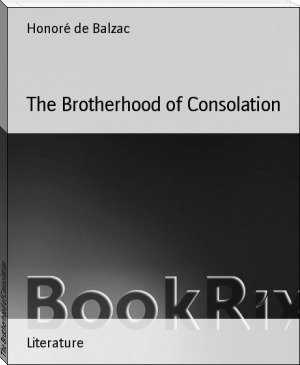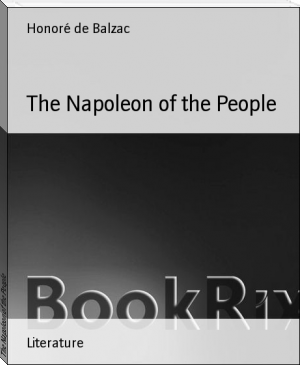The Brotherhood of Consolation by Honoré de Balzac (ereader manga txt) 📖

- Author: Honoré de Balzac
Book online «The Brotherhood of Consolation by Honoré de Balzac (ereader manga txt) 📖». Author Honoré de Balzac
"In 1807, after four years of rest and peace, Madame de la Chanterie married her daughter to a gentleman of rank, whose piety, antecedents, and fortune offered every guarantee that could be given,--a man who, to use a popular saying, 'was after every one's own heart,' in the best society of the provincial city where Madame and her daughter passed their winters. I should tell you that this society was composed of seven or eight families belonging to the highest nobility in France: d'Esgrignon, Troisville, Casteran, Nouatre, etc. At the end of eighteen months the baron deserted his wife, and disappeared in Paris, where he changed his name.
"Madame de la Chanterie never knew the causes of this desertion until the lightning of a dreadful storm revealed them. Her daughter, brought up with anxious care and trained in the purest religious sentiments, kept total silence as to her troubles. This lack of confidence in her mother was a painful blow to Madame de la Chanterie. Already she had several times noticed in her daughter indications of the reckless disposition of the father, increased in the daughter by an almost virile strength of will.
"The husband, however, abandoned his home of his own free will, leaving his affairs in a pitiable condition. Madame de la Chanterie is, even to this day, amazed at the catastrophe, which no human foresight could have prevented. The persons she prudently consulted before the marriage had assured her that the suitor's fortune was clear and sound, and that no mortgages were on his estate. Nevertheless it appeared, after the husband's departure, that for ten years his debts had exceeded the entire value of his property. Everything was therefore sold, and the poor young wife, now reduced to her own means, came back to her mother. Madame de la Chanterie knew later that the most honorable persons of the province had vouched for her son-in-law in their own interests; for he owed them all large sums of money, and they looked upon his marriage with Mademoiselle de la Chanterie as a means to recover them.
"There were, however, other reasons for this catastrophe, which you will find later in a confidential paper written for the eyes of the Emperor. Moreover, this man had long courted the good-will of the royalist families by his devotion to the royal cause during the Revolution. He was one of Louis XVIII.'s most active emissaries, and had taken part after 1793 in all conspiracies,--escaping their penalties, however, with such singular adroitness that he came, in the end, to be distrusted. Thanked for his services by Louis XVIII., but completely set aside in the royalist affairs, he had returned to live on his property, now much encumbered with debt.
"These antecedents were then obscure (the persons initiated into the secrets of the royal closet kept silence about so dangerous a coadjutor), and he was therefore received with a species of reverence in a city devoted to the Bourbons, where the cruellest deeds of the Chouannerie were accepted as legitimate warfare. The d'Esgrignons, Casterans, the Chevalier de Valois, in short, the whole aristocracy and the Church opened their arms to this royalist diplomat and drew him into their circle. Their protection was encouraged by the desire of his creditors for the payment of his debts. For three years this man, who was a villain at heart, a pendant to the late Baron de la Chanterie, contrived to restrain his vices and assume the appearance of morality and religion.
"During the first months of his marriage he exerted a sort of spell over his wife; he tried to corrupt her mind by his doctrines (if it can be said that atheism is a doctrine) and by the jesting tone in which he spoke of sacred principles. From the time of his return to the provinces this political manoeuvrer had an intimacy with a young man, overwhelmed with debt like himself, but whose natural character was as frank and courageous as the baron's was hypocritical and base. This frequent guest, whose accomplishments, strong character, and adventurous life were calculated to influence a young girl's mind, was an instrument in the hands of the husband to bring the wife to adopt his theories. Never did she let her mother know the abyss into which her fate had cast her.
"We may well distrust all human prudence when we think of the infinite precautions taken by Madame de la Chanterie in marrying her only daughter. The blow, when it came to a life so devoted, so pure, so truly religious as that of a woman already tested by many trials, gave Madame de la Chanterie a distrust of herself which served to isolate her from her daughter; and all the more because her daughter, in compensation for her misfortunes, exacted complete liberty, ruled her mother, and was even, at times, unkind to her.
"Wounded thus in all her affections, mistaken in her devotion and love for her husband, to whom she had sacrificed without a word her happiness, her fortune, and her life; mistaken in the education exclusively religious which she had given to her daughter; mistaken in the confidence she had placed in others in the affair of her daughter's marriage; and obtaining no justice from the heart in which she had sown none but noble sentiments, she united herself still more closely to God as the hand of trouble lay heavy upon her. She was indeed almost a nun; going daily to church, performing cloistral penances, and practising economy that she might have means to help the poor.
"Could there be, up to this point, a saintlier life or one more tried than that of this noble woman, so gentle under misfortune, so brave in danger, and always Christian?" said Monsieur Alain, appealing to Godefroid. "You know Madame now,--you know if she is wanting in sense, judgment, reflection; in fact, she has those qualities to the highest degree. Well! the misfortunes I have now told you, which might be said to make her life surpass all others in adversity, are as nothing to those that were still in store for this poor woman. But now let us concern ourselves exclusively with Madame de la Chanterie's daughter," said the old man, resuming his narrative.
"At eighteen years of age, the period of her marriage, Mademoiselle de la Chanterie was a young girl of delicate complexion, brown in tone with a brilliant color, graceful in shape, and very pretty. Above a forehead of great beauty was a mass of dark hair which harmonized with the brown eyes and the general gaiety of her expression. A certain daintiness of feature was misleading as to her true character and her almost virile decision. She had small hands and small feet; in fact, there was something fragile about her whole person which excluded the idea of vigor and determination. Having always lived beside her mother, she had a most perfect innocence of thought and behavior and a really remarkable piety. This young girl, like her mother, was fanatically attached to the Bourbons; she was therefore a bitter enemy to the Revolution, and regarded the dominion of Napoleon as a curse inflicted by Providence upon France in punishment of the crimes of 1793.
"The conformity of opinion on this subject between Madame de la Chanterie and her daughter, and the daughter's suitor, was one of the determining reasons of the marriage.
"The friend of the husband had commanded a body of Chouans at the time that hostilities were renewed in 1799; and it seems that the baron's object (Madame de la Chanterie's son-in-law was a baron) in fostering the intimacy between his wife and his friend was to obtain, through her influence, certain succor from that friend.
"This requires a few words of explanation," said Monsieur Alain, interrupting his narrative, "about an association which in those days made a great deal of noise. I mean the 'Chauffeurs.'[*] Every province in the west of France was at that time more or less overrun with these 'brigands,' whose object was far less pillage than a resurrection of the royalist warfare. They profited, so it was said, by the great number of 'refractories,'--the name applied to those who evaded the conscription, which was at that time, as you probably know, enforced to actual abuse.
[*] _Chauffeurs_. This name applies to royalists who robbed
the mail-coaches conveying government funds, and levied
tribute on those who bought the confiscated property of
_emigres_ at the West. When the Thermidorian reaction began,
after the fall of Robespierre, other companies of royalists,
chiefly young nobles who had not emigrated, were formed at
the South and East under various names, such as "The
Avengers," and "The Company of Jehu," who stopped the
diligences containing government money, which they
transmitted to Brittany and La Vendee for the support of the
royalist troops. They regarded this as legitimate warfare,
and were scrupulous not to touch private property. When
captured, however, they were tried and executed as
highwaymen.--TR.
"Between Mortagne and Rennes, and even beyond, as far as the banks of the Loire, nocturnal expeditions were organized, which attacked, especially in Normandy, the holders of property bought from the National domain.[*] These armed bands sent terror throughout those regions. I am not misleading you when I ask you to observe that in certain departments the action of the laws was for a long time paralyzed.
[*] The National domain was the name given to the
confiscated property of the _emigres_, which was sold from
time to time at auction to the highest bidder.--TR.
"These last echoes of the civil war made much less noise than you would imagine, accustomed as we are now to the frightful publicity given by the press to every trial, even the least important, whether political or individual. The system of the Imperial government was that of all absolute governments. The censor allowed nothing to be published in the matter of politics except accomplished facts, and those were travestied. If you will take the trouble to look through files of the 'Moniteur' and the other newspapers of that time, even those of the West, you will not find a word about the four or five criminal trials which cost the lives of sixty or eighty 'brigands.' The term _brigands_, applied during the revolutionary period to the Vendeans, Chouans, and all those who took up arms for the house of Bourbon, was afterwards continued judicially under the Empire against all royalists accused of plots. To some ardent and loyal natures the emperor and his government were the enemy; any form of warfare against them was legitimate. I am only explaining to you these opinions, not justifying them.
"Now," he said, after one of those pauses which are necessary in such long narratives, "if you realize how these royalists, ruined by the civil war of 1793, were dominated by violent passions, and how some exceptional natures (like that of Madame de la Chanterie's son-in-law and his friend) were eaten up with desires of all kinds, you may be able to understand how it was that the acts of brigandage which their political views justified when employed against the government in the service of the good cause, might in some cases be committed for personal ends.
"The younger of the two men had been for some time employed in collecting the scattered fragments of Chouannerie, and was holding them ready to act at an opportune moment. There came a terrible crisis in the Emperor's career when, shut up in the island of Lobau, he seemed about to give way under the combined
 Have you ever thought about what fiction is? Probably, such a question may seem surprising: and so everything is clear. Every person throughout his life has to repeatedly create the works he needs for specific purposes - statements, autobiographies, dictations - using not gypsum or clay, not musical notes, not paints, but just a word. At the same time, almost every person will be very surprised if he is told that he thereby created a work of fiction, which is very different from visual art, music and sculpture making. However, everyone understands that a student's essay or dictation is fundamentally different from novels, short stories, news that are created by professional writers. In the works of professionals there is the most important difference - excogitation. But, oddly enough, in a school literature course, you don’t realize the full power of fiction. So using our website in your free time discover fiction for yourself.
Have you ever thought about what fiction is? Probably, such a question may seem surprising: and so everything is clear. Every person throughout his life has to repeatedly create the works he needs for specific purposes - statements, autobiographies, dictations - using not gypsum or clay, not musical notes, not paints, but just a word. At the same time, almost every person will be very surprised if he is told that he thereby created a work of fiction, which is very different from visual art, music and sculpture making. However, everyone understands that a student's essay or dictation is fundamentally different from novels, short stories, news that are created by professional writers. In the works of professionals there is the most important difference - excogitation. But, oddly enough, in a school literature course, you don’t realize the full power of fiction. So using our website in your free time discover fiction for yourself. 




Comments (0)